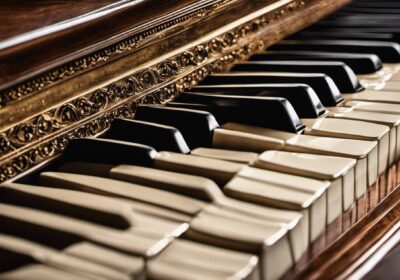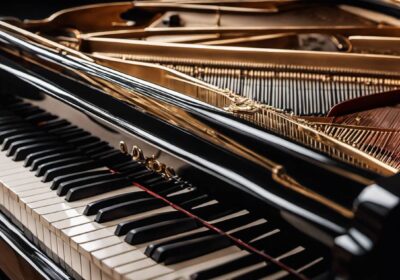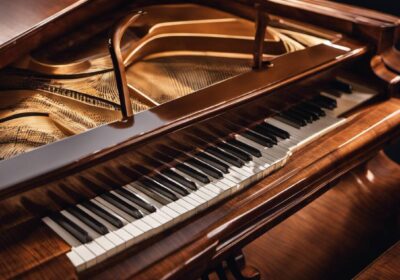Piano Lessons in Boise, Idaho
Dear friend,
It’s never too late to learn piano! In fact playing this instrument is not so different from learning how to build a chair or cook a recipe. Like woodworking or cooking, playing skillfully requires education and a willingness to try and ask questions – that’s it!
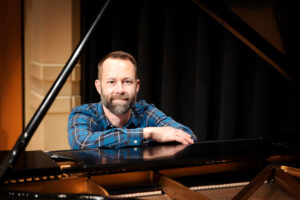 My name is Jeremy and I’m a local Boise piano teacher who loves helping students develop the performance skills they desire. Whether adults, kids, beginners or advanced, I provide music lessons to students that are fun, build confidence, and utilize each student’s passion. To build a solid musical foundation a given lesson can include theory, ear training, technique, rhythm practice, sight reading skills, improvisation, and repertoire review. I also teach jazz, playing by ear, and composition as alternatives to solo performance.
My name is Jeremy and I’m a local Boise piano teacher who loves helping students develop the performance skills they desire. Whether adults, kids, beginners or advanced, I provide music lessons to students that are fun, build confidence, and utilize each student’s passion. To build a solid musical foundation a given lesson can include theory, ear training, technique, rhythm practice, sight reading skills, improvisation, and repertoire review. I also teach jazz, playing by ear, and composition as alternatives to solo performance.
Your age and ability level is unimportant – don’t let being older, never having been a music student, or having no experience dissuade you. All ages and abilities can and do make remarkable progress with good information and a tailored course of instruction at their own pace. So give yourself or one you care for the pleasure of music-making; let me show you the way to piano proficiency!
My studio area location is near downtown Boise, ID and piano classes are weekly, half-hour or hour in length. For further information please explore the website and contact me for piano lessons!
Why take piano lessons?
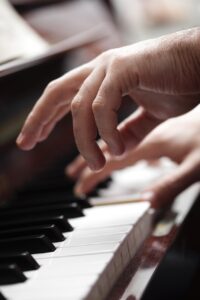 Piano lessons are a subset of music lessons in general and obviously focus on the piano as one of several possible instruments. My students have regular class with me here in Boise, ID. As their piano teacher and music instructor I help them develop a triangle foundation of piano instrument playing skills, music theory knowledge, and aural and listening skills. People begin at any age, stage, and level whether they’re beginners, intermediate, advanced, or expert. Their ages vary from child/kids, adolescent, teen, young adult, parents of the kids in lessons, middle-aged, and senior adults.
Piano lessons are a subset of music lessons in general and obviously focus on the piano as one of several possible instruments. My students have regular class with me here in Boise, ID. As their piano teacher and music instructor I help them develop a triangle foundation of piano instrument playing skills, music theory knowledge, and aural and listening skills. People begin at any age, stage, and level whether they’re beginners, intermediate, advanced, or expert. Their ages vary from child/kids, adolescent, teen, young adult, parents of the kids in lessons, middle-aged, and senior adults.
These are some aspects of playing ability a student develops by taking a traditional education approach to the piano… sight reading skills, rhythm, knowledge of notes and note reading, technique, scale, chord, and arpeggio execution, staff reading, performance confidence, experience, keyboard feel and comfort, passion, a song and solo piece repertoire, tone control, interpretation options, musical intuition, a sense of fun, the ability to play with others, strong work ethic, learning their individual pace, performance opportunity, and an optimal way to practice and learn piano.
By taking an alternate lesson approach to piano, such as jazz, pop, song writing, or composition, a student will develop the following playing skills… improvisation, capacity to solo and comp, the ability to play by ear, the ability to sing, timbre and sound recognition, modern music style information and content, a more current school of playing and understanding music, ability to offer musical services.
A music theory foundation is critical and includes the following…past schools of music theory and understanding, posing important questions, learning resources to help with playing, classes of scales, chords, and sounds, world music as compared to Western music, a particular area of musical thought, famous past composers and music instructors/teachers, a planned course of music theory assignments, music theory aspects related to piano, relevant research, general tips to further instrument fluency, rhythm understanding, all music vocabulary and terms.
Aural skills developed include…singing skills, song discernment, playing after listening, interval and rhythm recognition, improvisation by ear, piano tone replication, fun and creativity with playing piano, musical memory, ability to play without notation, increased confidence at the piano, new forms of repertoire, access to a new part of music, the opportunity to play for the Boise, ID community at large, new tools for playing piano and other instruments.
Who can take piano lessons and from whom?
Anyone can! Nearly all ages, any ability level, and any musical background are welcome. All that’s needed is a desire to learn this amazing instrument.
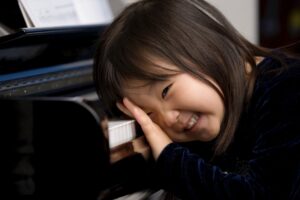 As a piano instructor I instruct ages ranging from 1st grade through senior adults. Although kids under age seven can certainly learn piano there are other music teachers in Boise more qualified than me to teach that age. I’ve been a piano teacher to kids, teens, and adults and enjoy giving lessons to each demographic for different education reasons. When I first began teaching piano I started by focusing on adult students. Today I have an even split between adults, teenagers, and children. I’ve been a piano teacher for 13 years now and am always learning new information to better tailor instruction to each age group. So if you want to learn piano, regular lessons will benefit you regardless of your age – just dive in!
As a piano instructor I instruct ages ranging from 1st grade through senior adults. Although kids under age seven can certainly learn piano there are other music teachers in Boise more qualified than me to teach that age. I’ve been a piano teacher to kids, teens, and adults and enjoy giving lessons to each demographic for different education reasons. When I first began teaching piano I started by focusing on adult students. Today I have an even split between adults, teenagers, and children. I’ve been a piano teacher for 13 years now and am always learning new information to better tailor instruction to each age group. So if you want to learn piano, regular lessons will benefit you regardless of your age – just dive in!
Depending on the style I can give classes to nearly any piano ability level – beginners, elementary, intermediate, advanced, or expert. You might already have a good music and piano foundation or you may not – it doesn’t matter either way. If you want to take a classical/traditional type of lesson then I can teach anyone through an advanced level. For expert level piano lessons I would refer you to certain instructors in Boise, ID who have either a doctorate in piano performance and/or are a professor at Boise State University. For students interested in jazz I can instruct up through an intermediate level before referring a student to a new music teacher. For those wanting a pop piano and play by ear approach I can teach at any level through expert. Composition and song writing lessons I can give instruction up through advanced levels.
Students also wonder if their musical background (or lack thereof) makes a difference. It does in the sense that if you already have some knowledge and skill set it will help get you going at a farther starting point. A musical background can include rhythm and counting, sight reading skills, staff and notes, practice experience, technique (including scale, chord, and arpeggio knowledge), the ability to play other instruments, some music theory, a general feel for the piano, other types of music lessons like flute, clarinet, or violin, some learned repertoire, another music instructor, improvisation skills, solo performance, or even group lessons.

